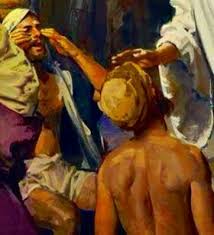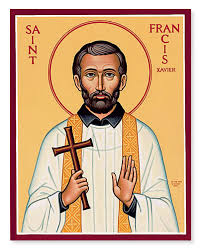HOMILY ADVENT WEEK 01 05 – Year II
Seeing with the Eyes of Faith:
Memorial of St. Francis Xavier
(Isaiah 29:17-24; Ps 27; Mt 9:27-31)
***********************************************
“Do you see what I see?”
This line from a familiar Christmas Carol, along with today’s readings, invite us to see Jesus with the eyes of faith, and come to him for healing and new life.
The reading from Isaiah promises a time in the future when there will be a great transformation – barren deserts will blossom with verdant growth; the blind will receive sight, justice will be rendered, those who are ashamed will stand confident, those who are confused will understand and all will stand in awe of the Holy One of Israel.
In the gospel, we see these words of Isaiah being fulfilled in unexpected ways – through a poor, itinerant, back-woods preacher by the name of Jesus of Nazareth. It is interesting that it is two blind men who are able to “see” this humble rabbi for who he truly was – Son of David and Lord.
 When they heard about Jesus, they believed, without being able to see him, that he could heal them. So, they followed after Jesus with faith so strong they persisted and followed him right into the house he entered. Then, when he asked whether they believed he could heal them, they confidently said “Yes.” And with that, and Jesus’ loving touch, their eyes were opened.
When they heard about Jesus, they believed, without being able to see him, that he could heal them. So, they followed after Jesus with faith so strong they persisted and followed him right into the house he entered. Then, when he asked whether they believed he could heal them, they confidently said “Yes.” And with that, and Jesus’ loving touch, their eyes were opened.
We can follow after Jesus with the same kind of faith, enter his house, and persist in asking him to open our eyes to who he truly is, receive his forgiveness and healing, and experience that new life only he can give. It is not a complicated matter, either. We can make sure we are spending time every day in prayer and Scripture reading. We can be vigilant in repenting for any sins that cloud our consciences. And we can try our best to treat the people around us with the love and respect they deserve. This simple formula will open our eyes – and it will move us to ask others, “Do you see what we see?”
Bishop Robert Barron reminds us that blindness in the Bible is very often a symbol of spiritual blindness: the incapacity to see what truly matters. Focused on the worldly goods of wealth, pleasure, power, and honor, most people don’t see how blind they are to the truly important things: giving oneself to the grace of God and living a life of love. If we have not surrendered to the grace of God, we are blind. How wonderful it is, then, that these men in the Gospel can cry out to Jesus in their need.
They are, of course, making a petition for physical healing, but it’s much more than that for us. It’s asking for that one thing that finally matters: spiritual vision—to know what my life is about, to know the big picture, to know where I’m going. We can have all the wealth, pleasure, honor, and power we want. We can have all the worldly goods we could desire. But if we don’t see spiritually, it will do us no good; it can even destroy us.
 Today the Church invites us to honor St. Francis Xavier, who met St Ignatius Loyola at the University of Paris, and was one of the first members of the Society of Jesus (Jesuits). Francis spent many years working as a missionary with the peoples of Goa, Southeast Asia and Japan. He had excellent organizational skills: the communities he established continued to flourish long after his departure. Francis died of fever while on his way from Goa to China, in 1551. He was canonized in 1602 and is a patron of all foreign missions.
Today the Church invites us to honor St. Francis Xavier, who met St Ignatius Loyola at the University of Paris, and was one of the first members of the Society of Jesus (Jesuits). Francis spent many years working as a missionary with the peoples of Goa, Southeast Asia and Japan. He had excellent organizational skills: the communities he established continued to flourish long after his departure. Francis died of fever while on his way from Goa to China, in 1551. He was canonized in 1602 and is a patron of all foreign missions.
The Eucharist is both a foretaste of that enticing future foreseen by Isaiah, and a profound celebration of faith in Jesus as the Bread of Life. May our celebration help us see Jesus with the eyes of faith as did the blind men, and come to him for forgiveness, healing and new life.



